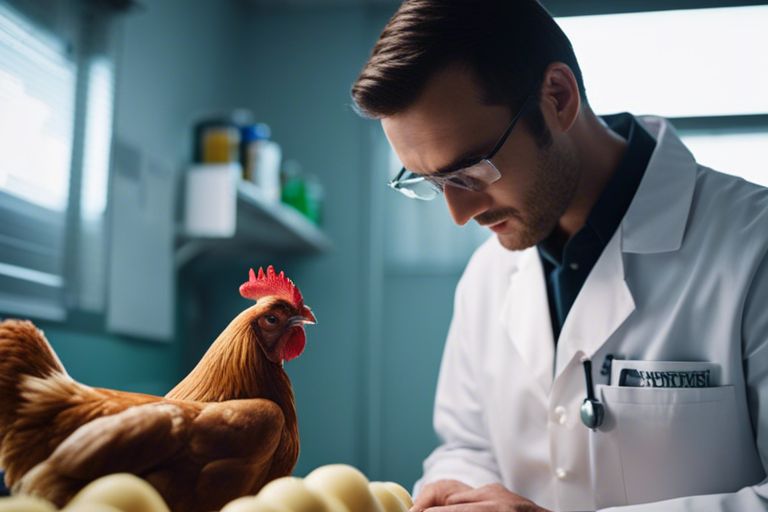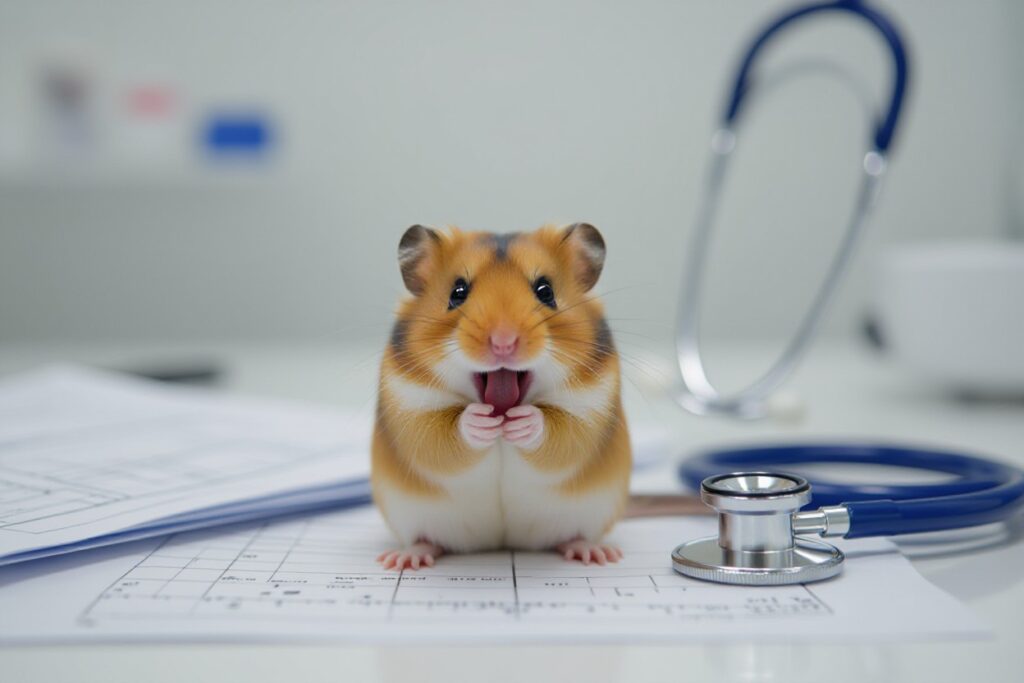Chickens, just like any other living creature, benefit from regular health check-ups to ensure their well-being and longevity. By scheduling routine check-ups for your feathered friends, you can catch potential health issues early and provide timely treatment, ultimately saving you time, money, and the heartache of losing a beloved chicken. Regular health assessments also help to maintain optimal growth, egg production, and overall vitality in your flock. Let’s explore the importance of routine health check-ups for chickens and how they can contribute to the overall health and happiness of your feathered companions.
Identifying Common Poultry Diseases
Symptoms to Watch For
Any poultry owner must be vigilant in observing their flock for any signs of illness. Common symptoms of poultry diseases include unusual lethargy, decreased egg production, abnormal breathing, diarrhea, and changes in comb color. Recognizing these signs early on can help in preventing the spread of disease within your flock.
Preventative Measures and Treatments
Measures such as practicing good biosecurity measures, providing a balanced diet, and ensuring a clean living environment can significantly reduce the risk of diseases in your chickens. Regular vaccinations and deworming are vital preventive measures that can help protect your flock against common poultry diseases. In the event of an outbreak, prompt isolation of sick birds and seeking veterinary assistance are crucial steps to prevent further spread of the disease.
Understanding the different types of poultry diseases, their modes of transmission, and suitable treatment options is key to maintaining a healthy flock. By staying informed and proactive in managing the health of your chickens, you can minimize the risk of potentially devastating outbreaks and ensure the well-being of your poultry.
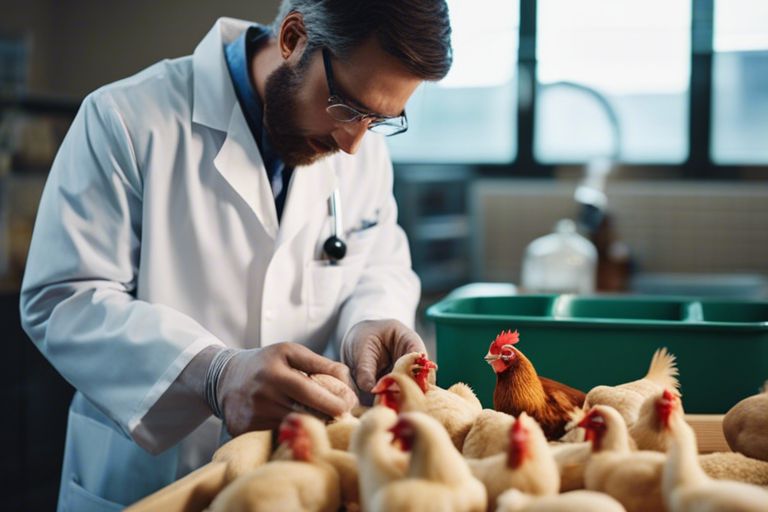
Nutritional Assessments and Diet Optimization
Essential Nutrients for Chickens
An crucial aspect of routine health check-ups for chickens is ensuring they receive adequate nutrition. Chickens require a balanced diet that includes crucial nutrients such as proteins, carbohydrates, fats, vitamins, and minerals. Deficiencies in these nutrients can lead to various health problems and reduced productivity in the flock. Regular nutritional assessments can help identify any deficiencies and allow for adjustments to the diet to optimize the health and performance of the chickens.
Impact of Diet on Health and Productivity
With a proper diet being crucial for the overall health and productivity of chickens, it is important to understand the impact it can have on their well-being. Chickens that are not fed a balanced diet may experience health issues such as weak immune systems, decreased egg production, and poor growth. By conducting routine health check-ups and nutritional assessments, veterinarians can work with poultry owners to develop a diet plan that meets the specific needs of the flock.
This ensures that the chickens are getting the necessary nutrients to thrive and stay healthy, ultimately leading to improved productivity and overall well-being for the flock. Regular monitoring of the diet and making necessary adjustments based on nutritional assessments can make a significant difference in the health and performance of chickens.
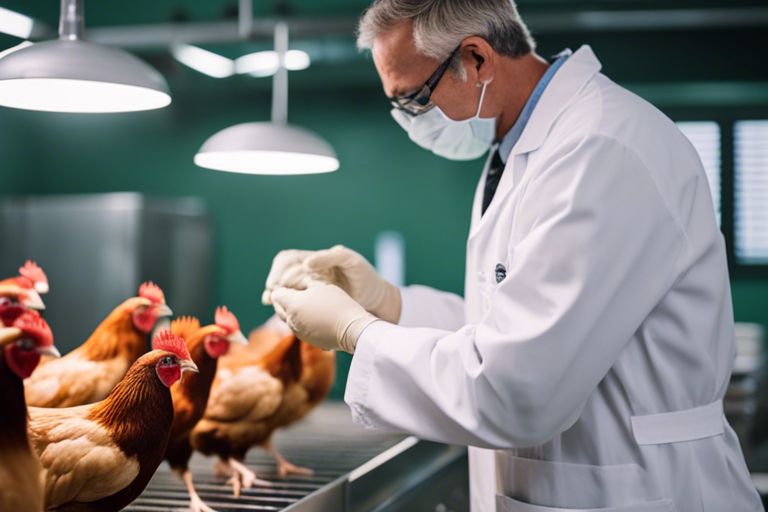
The Role of Vaccinations in Poultry Health
Types of Vaccines and Their Benefits
All poultry, including chickens, require vaccinations to protect them against various diseases. Vaccines are crucial in poultry health as they help prevent the spread of infectious diseases within flocks. Different types of vaccines are used in poultry farming, each targeting specific diseases and providing immunity against them. Some common vaccines include those for Newcastle disease, infectious bronchitis, and Marek’s disease.
| Vaccine Type | Benefits |
|---|---|
| Newcastle Disease | Protects against a highly contagious viral disease. |
| Infectious Bronchitis | Prevents respiratory issues in chickens. |
| Marek’s Disease | Prevents tumors and paralysis in poultry. |
| Fowl Pox | Provides immunity against a viral skin disease. |
| Avian Influenza | Protects against a highly contagious viral infection. |
Though vaccines cannot guarantee 100% immunity, they are imperative in reducing the risk of disease outbreaks in poultry farms.
Vaccination Schedule and Protocols
Vaccination schedules for chickens should be well-planned and implemented to ensure proper immunity levels. Poultry farmers should consult with veterinarians to develop a customized vaccination program based on the specific needs of their flock. It is crucial to administer vaccines at the right time and follow recommended protocols to maximize their effectiveness.
Poultry health professionals recommend following strict guidelines when it comes to administering vaccines to poultry. They should be handled and stored correctly to maintain their potency. Regular revaccination may be necessary for some diseases to ensure continuous protection for the flock.
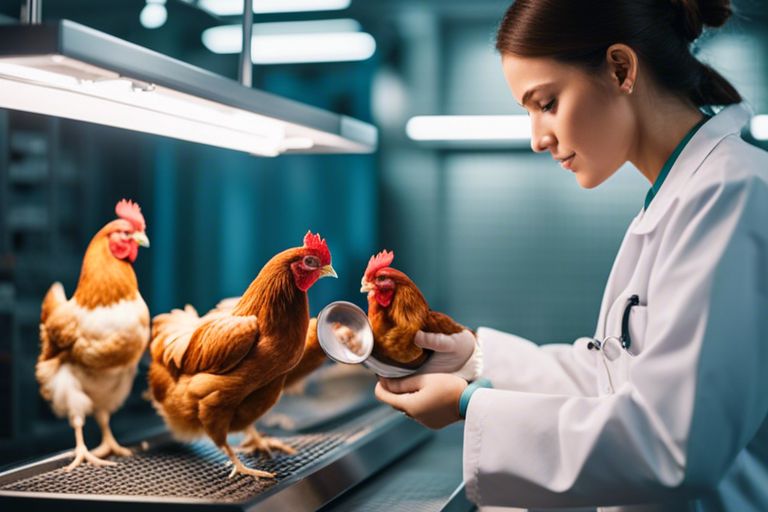
Record Keeping and Monitoring
Importance of Health Records
To ensure the optimal health and well-being of your chickens, maintaining detailed health records is crucial. An accurate and up-to-date record of vaccinations, illnesses, treatments, and any unusual behavior or symptoms can provide valuable insights into their overall health status. By keeping thorough health records, you can track patterns, identify potential health issues early, and make informed decisions regarding their care and treatment.
Utilizing Data for Health Management
Monitoring and analyzing the data collected from health records can significantly enhance your chicken health management practices. By tracking trends in illness outbreaks, vaccination effectiveness, and treatment responses, you can adjust your management strategies effectively. Utilizing this data allows you to implement preventive measures, improve biosecurity, and optimize the health and productivity of your flock.
Monitoring their health regularly through routine check-ups and keeping meticulous records can contribute to the overall success of your chicken farming endeavors. By embracing a proactive approach to health management and utilizing data-driven insights, you can optimize the well-being of your chickens and ensure a thriving and sustainable flock.
Conclusion
The benefits of routine health check-ups for chickens are undeniable. By monitoring their health regularly, you can detect any potential issues early on, prevent the spread of diseases, and ensure the overall well-being of your flock. With proper veterinary care and attention, you can keep your chickens happy and healthy, ultimately leading to higher egg production and a longer lifespan for your feathered friends.
FAQ
Q: Why are routine health check-ups important for chickens?
A: Routine health check-ups for chickens are important to monitor their overall well-being, detect any health issues early, and prevent potential diseases from spreading within the flock.
Q: How often should chickens have health check-ups?
A: Chickens should have routine health check-ups at least once a year, but more frequent check-ups, such as every 6 months, may be necessary for older chickens or if there are specific health concerns.
Q: What should be included in a routine health check-up for chickens?
A: A routine health check-up for chickens should include a physical examination to check for any abnormalities, weight assessment, checking for signs of parasites, and evaluating their general behavior and egg production.
Q: How can health check-ups help prevent diseases in chickens?
A: Regular health check-ups can help identify and address potential health issues early, allowing for timely treatment and preventing the spread of diseases among the flock.
Q: What are some signs that indicate a chicken may need a health check-up?
A: Signs that indicate a chicken may need a health check-up include changes in appetite, weight loss, reduced egg production, abnormal droppings, respiratory issues, abnormal behavior, and visible signs of injury or illness.
Q: Who should conduct health check-ups for chickens?
A: Health check-ups for chickens can be conducted by a qualified veterinarian with experience in poultry health or by experienced poultry farmers who are familiar with common health issues in chickens.
Q: Are there any specific vaccinations recommended for chickens during health check-ups?
A: Yes, vaccinations are an important part of routine health check-ups for chickens. Vaccinations for common poultry diseases such as Newcastle disease, Marek’s disease, and Infectious Bronchitis should be administered as recommended by a veterinarian.
